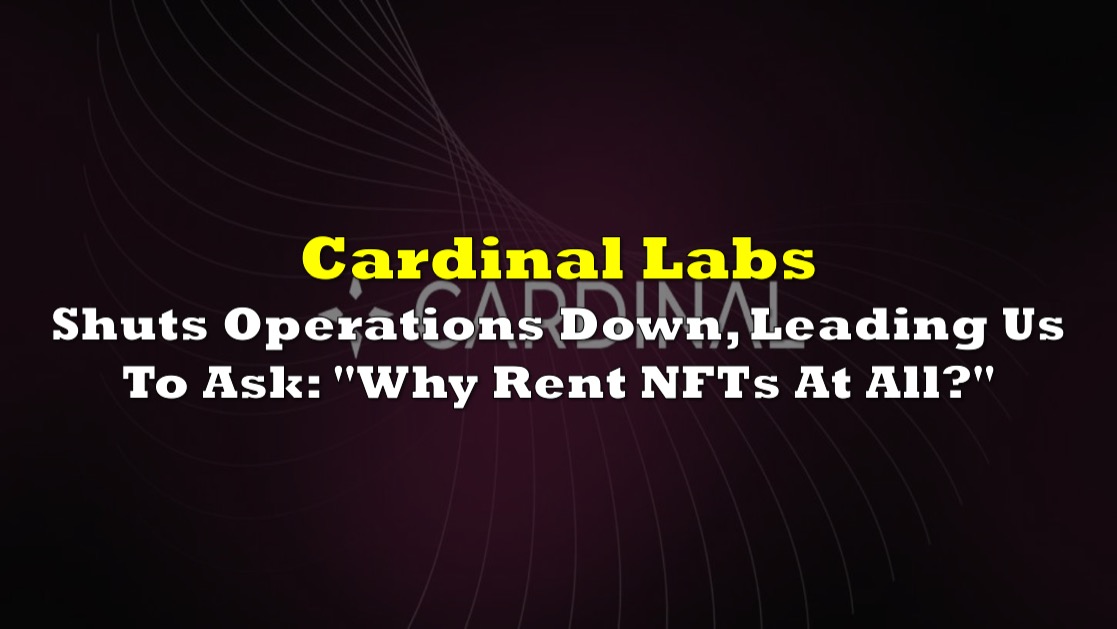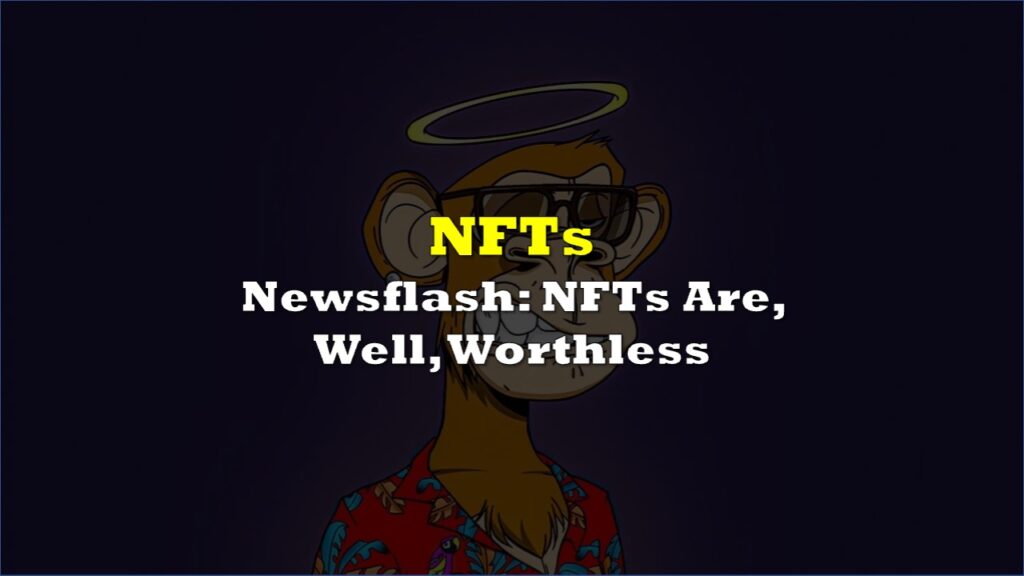Solana-based protocol Cardinal Labs has announced its decision to wind down operations, citing challenging economic conditions. The protocol, which raised $4.4 million in funding nearly a year ago to enhance the utility of nonfungible tokens (NFTs), made the announcement on Twitter and set August 26 as the deadline for all withdrawals.
Cardinal Labs served as an infrastructure provider on the Solana network, offering protocols and software development kits (SDKs) for various NFT use cases, including staking, rentals, subscriptions, royalties, and trading. However, as per the closing schedule outlined in the announcement, certain operations will be halted on July 19. These include the creation of staking pools, token management, NFT rentals and rental extensions, as well as management of social media handles and new deposits.
“After a lot of reflection, we’ve decided to begin the process of winding down our protocols,” the firm tweeted. “We’ve done our best to navigate this incredibly difficult macroeconomic environment since we began building 18 months ago, but like for many others, it has been challenging.”
Hey Everyone, we have some unfortunate news to share 🙁
— Cardinal (@cardinal_labs) June 28, 2023
After a lot of reflection, we’ve decided to begin the process of winding down our protocols. Let's dive into it 🧵 ⬇️
While NFT-based products gained some traction–including what they call conditional ownership of NFTs–they acknowledged that these offerings remained limited to the crypto maximalist community, hindering broader adoption.
In July 2022, Cardinal Labs secured $4.4 million in a seed funding round, with participation from prominent entities such as Protagonist, Solana Ventures, Animoca Brands, Delphi Digital, CMS Holdings, and Alameda Research. Notably, the spokesperson for Cardinal Labs clarified that Alameda Research’s investment was a small portion of the round and did not contribute to the protocol’s financial difficulties.
In total, Cardinal Labs raised $5.2 million over the course of 18 months and had more than 65,000 NFTs staked on its platform as of July 2022.
Despite Cardinal Labs’ closure, the NFT market as a whole appears to be slowly maturing. A recent report from DappRadar highlighted a strong start to the year, with the first quarter of 2023 being the best since the second quarter of 2022. Although trade volume saw a decrease in March, the overall performance remained robust due to intense competition among NFT marketplaces.

Twitter user and crypto expert JagoeCapital noted that Solana-related protocols have been facing challenges in the market, pointing out Cardinal Labs’ shutdown as a recurring theme among Solana projects.
“Cardinal announced a $4.4 Million raise just 11 months ago led by Solana Ventures and ProtagonistXYZ with headline participation from Alameda Research, Animoca Brands and Delphi Digital. Today they announced they will be shutting down. It’s becoming a common theme with Solana projects,” they tweeted.

Cardinal Labs expressed their hope for faster blockchain adoption but stated that their offerings remained confined to the crypto maximalist community. Despite the closure of the protocol, the code behind Cardinal Labs will remain open source, and the team assured users that their assets are safe and will be returned to them at the end of the process.
To facilitate the wind-down process, Cardinal Labs established a withdrawal deadline of August 26, urging users to manually withdraw their assets between June 28 and August 26. Activities such as staking, token management, NFT rentals, and rental extensions will be disabled starting July 19. Deposits that remain at the end of the notice period will be forcibly withdrawn to depositors’ addresses.
Following the wind-down, Cardinal Labs will take down its user interfaces and remove its smart contract deployments from the Solana network. The protocol will also return SOL-denominated rent stored in all accounts to the initial fee/rent payers during the process of removing the smart contracts.
Additionally, teams utilizing the Cardinal Labs protocol via CPI from other smart contracts in different business contexts are advised to consider the implications of the wind-down timeline on their respective platforms and systems.
So, why rent NFTs?
NFT rentals or conditional ownership of NFTs is one of the more popular services offered by Cardinal Labs. NFT renting refers to the practice of borrowing an NFT from a specific NFT renting protocol, like Cardinal Labs, to temporarily experience or utilize its benefits, even if the individual does not own or possess the NFT themselves.
When NFTs first came to the scene, many critics argue that the hype surrounding NFTs has led to a speculative market where the focus is on the potential for financial gain rather than the artistic value or originality of the works. After all, like art, the value of a piece is extremely relative to the seller or the buyer. Moreover, there’s a debate that owning an NFT does not necessarily grant copyright or intellectual property rights over the underlying content, leading to confusion and potential disputes.
Basically, you’re paying money for a digital thingamabob, most of which can be easily searched online for a copy. This opened the path for potential scams and money laundering activities.
So, while NFT ownership itself is still in dubious stance, NFT rentals coming into the scene leaves more head scratches than the actual purchase of the digital asset.
Can anyone explain why someone would want to rent an NFT? https://t.co/LmsWC8pxti
— The Deep Dive (@TheDeepDive_ca) June 29, 2023
The primary motivation behind NFT renting is straightforward: financial gain. For lenders, renting NFTs presents an avenue to generate passive income by leveraging their NFT holdings.
There are two main types of NFT renting: collateral renting and collateral-less renting. Collateral NFT renting involves the borrower providing collateral–most of the time, of a higher price point than the NFT–to temporarily use someone else’s NFT. The NFT is placed in a rental smart contract, and the borrower must pay a rental fee. After the contract expires, the NFT is returned to the owner, and the borrower receives their collateral back.
Collateral-less NFT renting is similar to collateral renting, but the borrower receives a wrapped NFT with the same characteristics as the original asset. At the end of the contract, the wrapped NFT is burned. This model reduces financial risks for both parties, as the original asset remains with the owner, and the borrower doesn’t need to provide collateral.
From the borrower’s perspective, many reasons can be identified for renting an NFT. The practice enables collectors to diversify their holdings and experience a broader range of digital assets. Instead of focusing on owning a few NFTs outright, individuals can rent different pieces periodically, exploring various collections and artists.
Imagine renting an artwork (a real one) of an up-and-coming artist, which would be cheaper than actually buying the piece, and displaying it on your wall. The artist could blow up to be a big name in the art scene, which means the artwork’s value can skyrocket and people would now admire your taste in art. So, you rent more works of this artist and maybe someday, you’d be more certain in your decision to invest in that artist because you’ve experienced “owning” works of the now-famous artist.
The similar flow can be said for NFT rental, albeit in a more volatile and speculative manner. It allows them to try out NFTs from various creators, assess their value, and decide whether to invest in them in the future.
There are also instances where individuals have specific, time-bound requirements for an NFT. Renting offers a solution, granting them access to the NFT for their desired purpose and duration. This is applicable in the context of “play-to-earn” games, where NFTs serve as valuable in-game assets like characters or virtual lands, providing players with a competitive edge. Players compensate lenders with a predetermined amount of cryptocurrency in exchange for renting these NFTs.
But it can’t be denied that the monetary reason rings truer for NFT renters. Talking about benefits of an NFT without owning it further trims down the list to mostly for profit reasons. One can participate in NFT trading, also reaping benefits from jumps in values, without purchasing the asset.
However, like NFTs itself, NFT renting is heavily tied to the trustworthiness and viability of the protocols that offer this service. Cardinal Labs’ shutdown is just one of the many proofs that the whole nonfungible scene is still on thin ice.
Information for this briefing was found via Coin Telegraph, AirNFTs, and the sources mentioned. The author has no securities or affiliations related to this organization. Not a recommendation to buy or sell. Always do additional research and consult a professional before purchasing a security. The author holds no licenses.









